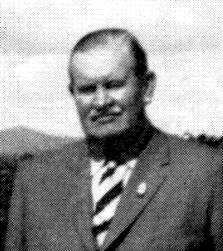Lieut.-Colonel John Herbert Alston DEAN, O.B.E.
Commanded the Depot Worcestershire Regiment from 1948 to May 1951.
John Dean was commissioned into The Worcestershire Regiment from the Royal Military College, Sandhurst, in 1928 and was posted to the 1st Battalion then stationed at Allahabad, moving the following year to Shanghai, China, and in 1931 to Plymouth where he served in 'A' and 'D' (M.G.) Companies, moving in 1935 to Ramillies Barracks, Aldershot. He next carried out a two year tour of duty (1933-34) at the Regimental Depot of which, 15 years later, he was to become Commanding Officer. In September 1935, he left the 1st Battalion Worcestershire Regiment for what was to be an eight-year tour of Colonial Service with the Royal West African Frontier Force where he served, successively, with the 4th and 7th Battalions, R.W.A.F.F. (Royal West African Frontier Force), at Kaduna, Kano, Zaria, Ibadan and Lagos in Nigeria, where he also commanded No. 4 (West African) Brigade Reconnaissance Squadron. He served for a short time with the 9th and 10th Battalions of The Worcestershire Regiment, in U.K., and in 1944 he went out to India, where he commanded No. 5 wing of the British Basic and Specialist Training Establishment at Ramgarh until the end of the war. He returned to England in 1946, and after a short time in the "Holding Battalion" of The Regiment he was posted, as Second-in-Command to Lt.-Colonel L. G. H. Bryant, to 29 Primary Training Centre (P.T.C.) at Norton Barracks. |
Lieut.-Colonel J. H. A. Dean |
In 1948 the 29 P.T.C. was disbanded, and the Regimental Depot proper re-started with John Dean as its first post-war Commanding Officer.
During his time as Depot Commander he took particular pains to lay the foundations of the close and happy relations which have since existed between the Regiment, the County, and the City of Worcester, and he was personally responsible for the detailed planning for the memorable day of 15th April, 1950, when the Regiment was granted the Freedom of Entry to the City of Worcester, and the Mayor and people of Worcester presented The Regiment with the four silver tenor Drums which are carried on parade by the 1st Battalion on all ceremonial occasions.
He retired from The Regiment and the Army on 19th October 1951, with the honorary rank of Lieut.-Colonel, on completion of 23 years service, to live first in Worcester and then at Cotheridge.
He became the first Chairman of the Worcester Army Cadet Force Welfare Committee of which he was still a member at the time of his death.
But it was to the Worcestershire Branch of the British Red Cross Society, of which he was appointed County Director in 1954 and which responsible post he held for the next 15 years, to which in recent years he had given his almost undivided attention.
As County Director of the Red Cross Society he was closely associated with the opening of two residential homes for the elderly at Redditch and Malvern, the formation of nine clubs for the handicapped, and three for mentally handicapped children.
During this period, the number of cadets more than doubled, and the branch has taken a keen interest in the Duke of Edinburgh Award Scheme. He initiated the Red Cross Christmas shopping expeditions for the disabled. For six years he was Regional Red Cross representative for the Midland Counties and had been a member of the National Executive Committee for eight years.
For these services he was appointed an Officer of the Most Excellent Order of the British Empire in the New Year's Honours List (Civil) on 1st January 1969.
He was also a member of the Worcestershire Association, and of the county branch of the Council for the Preservation of Rural England.
Lieut.-Colonel Dean was a former secretary of the Cotheridge Church Appeal Fund, and the chairman of the Cotheridge and Crown East Conservative Association.
Lieut.-Colonel John Herbert Alston Dean died, suddenly at his home, Longdon Heath Lodge, near Upton-upon-Severn on Saturday 11th January 1969, at the age of 62 years.
The funeral service took place at the little church of Queenhill, near Upton-on-Severn, which was filled to capacity, and the Rt. Reverend The Bishop of Worcester laid Colonel Dean's body to rest.
A service of Remembrance and Thanksgiving was held in Worcester Cathedral on 9th February 1969, which was attended by nearly 600 people.
The service was conducted by the Very Reverend Canon C. B. Armstrong, Vice-Dean of Worcester Cathedral, the Rt. Hon. The Viscount Cobham, Lord Lieutenant of Worcestershire, read the lesson, and the whole of the seating of the main south aisle of the Cathedral was taken up by uniformed members of the British Red Cross Society, from their Headquarters in London, from the City, and from the county.

